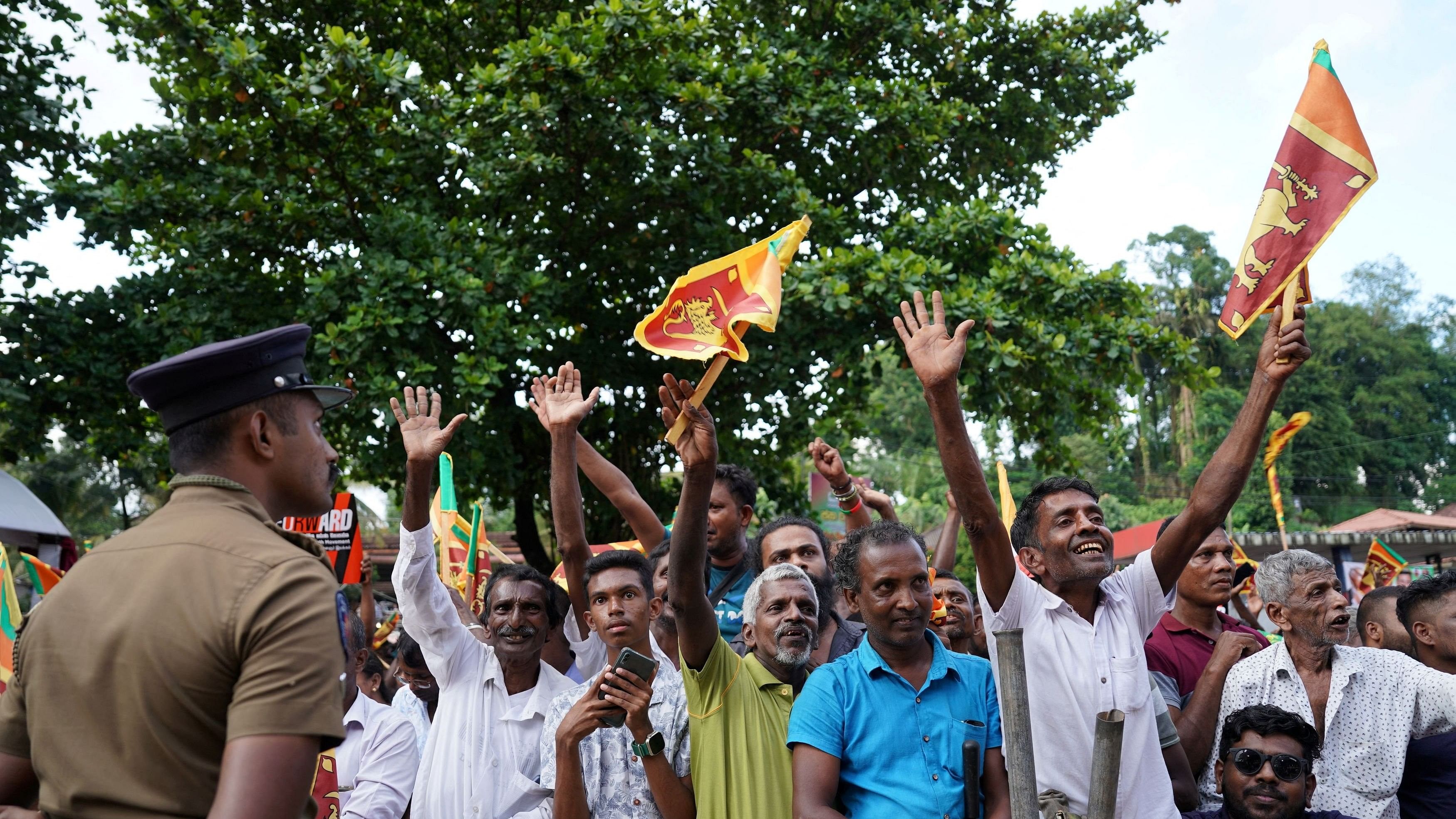
Supporters of the independent presidential candidate Ranil Wickremesinghe wave Sri Lanka's national flags during an election rally ahead of the upcoming presidential election in Ratnapura, Sri Lanka, September 15, 2024.
President Ranil Wickremesinghe is among the 28 candidates contesting Sri Lanka's presidential election on Saturday, a poll that is key to deciding the future of reforms in a nation battling its worst financial crisis in decades.
Below are short profiles of the five key candidates:
Ranil Wickermesinghe, 75
Sri Lanka's president Ranil Wickremesinghe gestures as he arrives at his final election campaign rally for the upcoming presidential election, scheduled for September 21, in Colombo, Sri Lanka.
Credit: REUTERS/Dinuka Liyanawatte
A lawyer who has served as prime minister a record six times, Wickremesinghe's party holds only one seat in parliament and will need to drum up support from key parties to bolster his chances.
As the leader of the United National Party (UNP), he took office in July 2022 after widespread protests unleashed by the debilitating financial crisis forced his predecessor Gotabaya Rajapaksa to flee Sri Lanka and later resign.
Parliament elected Wickremesinghe to serve out the rest of the five-year term of Rajapaksa, who took office in 2019.
Wickremesinghe's re-election bid failed to get formal backing from the Sri Lanka Podujana Peramuna (SLPP), the party with the most seats in the 225-member parliament, but the support of more than 90 lawmakers puts him in strong position. He is contesting as an independent candidate.
Sajith Premadasa, 57
Sajith Premadasa, leader of the Samagi Jana Balawegaya party, addresses his supporters during an election campaign rally ahead of the presidential election, in Colombo, Sri Lanka September 18, 2024.
Credit: REUTERS/Thilina Kaluthotage
Opposition leader and son of former President Ranasinghe Premadasa, he leads the Samagi Jana Balawegaya (SJB) that broke with Wickremesinghe's UNP in 2020.
His centrist, more left-leaning party has called for changes to the $2.9 billion bailout programme with the International Monetary Fund and outlined plans to adjust some targets, such as changing taxes to reduce the cost of living.
Premadasa favours a mix of interventionist and free-market economic policies.
Anura Kumara Dissanayake, 55
Anura Kumara Dissanayake, the presidential candidate from National People's Power, addresses his supporters during an election campaign rally ahead of presidential election, on the outskirts of Colombo, Sri Lanka, September 18, 2024.
Credit: REUTERS/Stringer
Despite holding just three seats in parliament, Dissanayake's promise of tough anti-corruption measures and pro-poor policies have given a popular boost to his candidacy.
He will contest under the National People's Power (NPP) coalition, which includes his Marxist-leaning party People's Liberation Front. His party has traditionally backed stronger state intervention and more closed market economic policies.
A pre-election opinion survey showed Dissanayake was leading in voting preferences at 36%, followed by Premadasa and Wickremesinghe at third.
Namal Rajapaksa, 38
Namal Rajapaksa of the Sri Lanka Podujana Peramuna party, gestures as he arrives at the Election Commission in Rajagiriya to submit his nomination papers for the upcoming presidential election, scheduled for September 21, in Colombo, Sri Lanka August 15, 2024.
Credit: REUTERS/Dinuka Liyanawatte
Scion of the powerful Rajapaksa family that produced two presidents - his father Mahinda and uncle Gotabaya - Namal is a surprise entrant, as the candidate of the Sri Lanka Podujana Peramuna (SLPP), founded by another uncle, Basil.
He faces the daunting task of keeping the party unified to counter Wickremesinghe's chances of winning.
Nuwan Bopage, 40
Nuwan Bopage, a presidential candidate from the People's Struggle Alliance, gestures as he arrives to attend an election campaign rally ahead of the presidential election, in Homagama, Sri Lanka, September 16, 2024.
Credit: REUTERS/Stringer
The candidate of the Peoples' Struggle Alliance, Bopage hopes to tap into the remnants of the massive people's uprising that deposed Gotabaya Rajapaksa two years back.
He has taken a strong anti-corruption stance, backs more pro-poor policies and opposes Sri Lanka's alignment with the IMF programme. (Reporting by Uditha Jayasinghe; editing by Sudipto Ganguly and Miral Fahmy)